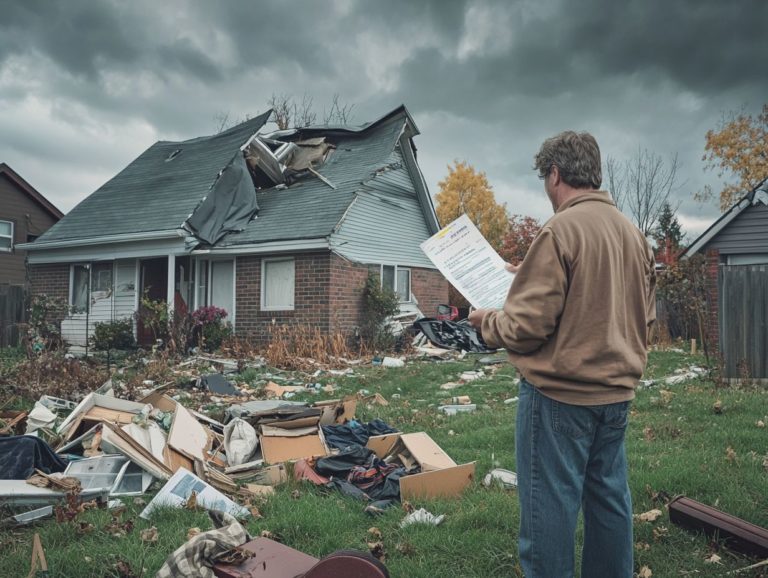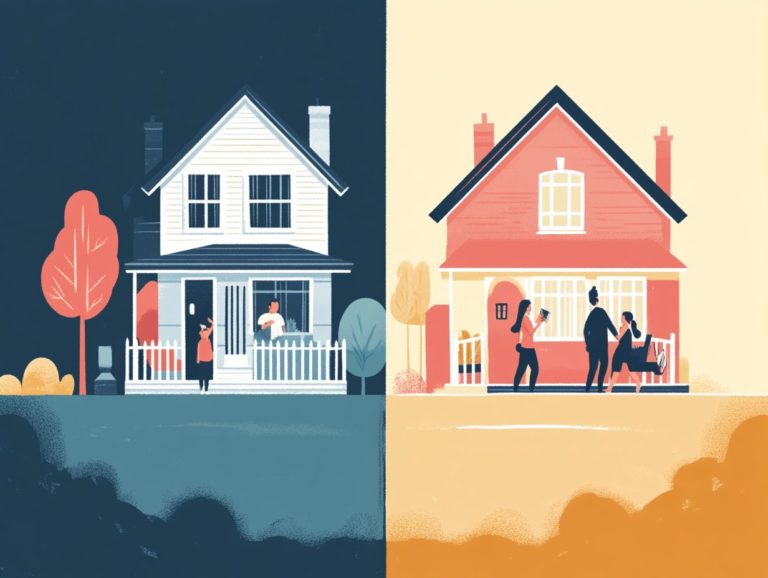What Is the Average Cost of Home Insurance?
Home insurance serves as a crucial shield for homeowners, offering peace of mind when unexpected events arise. But what exactly does it cover? How can you understand it better?
This article distills the essentials of home insurance. It highlights its significance and the various factors that affect costs. You ll learn how to calculate average premiums, uncover savings tips, and gain a deeper understanding of your policy’s coverage.
Whether you’re a first-time buyer or looking to optimize your current coverage, this guide will equip you with the insights you need.
Contents
- Key Takeaways:
- Understanding Home Insurance
- Factors that Affect Home Insurance Costs
- Calculating the Average Cost of Home Insurance
- Ways to Save on Home Insurance
- Understanding Your Home Insurance Policy
- Frequently Asked Questions
- What Is the Average Cost of Home Insurance?
- What Factors Influence the Cost of Home Insurance?
- How Can I Save Money on My Home Insurance?
- What Is the Average Cost of Home Insurance for a Rental Property or Vacation Home?
- Does the Size of My Home Affect the Cost of Home Insurance?
- Are there any discounts available for home insurance?
Key Takeaways:

- Home insurance is crucial for protecting your investment and belongings against damage or loss.
- Factors such as location, property value, coverage type, and personal details can affect insurance costs.
- National and state averages can provide cost insights, but obtaining accurate quotes is vital for savings.
Understanding Home Insurance
Understanding home insurance is essential for homeowners. It provides vital financial protection against unexpected events and ensures peace of mind regarding property damage and claims history.
This insurance includes several important aspects, such as coverage limits and policy details tailored to your specific needs. With the right policy, you can effectively safeguard your investment and navigate the complexities of insurance coverage.
What Is Home Insurance and Why Is It Important?
Home insurance, or homeowners insurance, is your financial safety net against various risks, including property damage, theft, and liability claims. It s an essential safeguard for any homeowner.
This policy is your home’s best defense! It protects the structure through dwelling coverage, ensuring you receive adequate compensation for damages caused by unforeseen events like fires or storms.
You also benefit from personal property coverage, which keeps your belongings safe within your walls. Let s not overlook liability coverage, which shields you from claims related to injuries or damages occurring on your property.
This layered approach brings peace of mind. It also protects your long-term financial stability. With home insurance in your corner, you can confidently navigate life s uncertainties without fear.
Factors that Affect Home Insurance Costs
Several factors significantly influence the costs of homeowners insurance. Understanding these variables can help you make informed decisions when selecting coverage options and providers.
Your location and property characteristics, along with personal details like your claims history and credit score, play a vital role in determining your insurance rates and overall affordability.
Location and Property Value
The location of your property and its value are pivotal in determining homeowners insurance costs. If your home is in an area prone to catastrophic weather or high crime rates, you can expect to pay higher premiums.
Factors like state averages for natural disasters, flood zones, and local crime statistics significantly impact how insurers set pricing. For instance, if your property is in a coastal region, you may face elevated premiums due to hurricane risks. Similarly, homes in urban areas with high theft rates could incur increased costs.
Insurers closely examine these factors. They often use local data to determine risk levels. Being aware of how your specific location affects the insurance market enables you to seek tailored solutions that account for your area’s unique characteristics and your individual needs.
Type of Coverage and Deductibles

The type of coverage and deductible you choose greatly affects your homeowners insurance costs. Typically, lower deductibles lead to higher premiums.
As a homeowner, you need to explore various coverage options:
- Dwelling coverage
- Personal property
- Liability
- Additional living expenses
This ensures your assets are well protected. Each option has specific limits that determine the money you can get if something goes wrong.
While higher coverage limits can provide peace of mind, they often lead to increased premium costs. The deductible you choose also plays a critical role in managing your out-of-pocket expenses. A higher deductible could lower your monthly premiums but may increase your costs during a claim.
Therefore, it’s essential to carefully assess your financial situation and risk tolerance to find the right balance.
Personal Factors and Claims History
Personal factors such as your claims history, credit score, and various other details can significantly influence the rates you receive from insurance companies, ultimately affecting the overall cost of your homeowners insurance.
Many individuals often overlook this impact. Their financial behaviors like making timely bill payments and minimizing high-risk claims can play a crucial role in shaping their insurance premiums.
Insurance providers are always watching your personal characteristics to gauge how risky you might be as an applicant. A solid claims history not only demonstrates your responsibility but could also open the door to potential discounts, thereby lowering your coverage costs.
Maintaining a strong credit score can lead to additional reductions, as it signifies reliability and financial stability. This encourages homeowners like you to adopt more prudent financial practices, ultimately benefiting your insurance premiums.
Calculating the Average Cost of Home Insurance
Understanding the average cost of home insurance is crucial for making smart financial decisions! It requires a thoughtful consideration of both national and state averages. This approach provides you with a clearer understanding of what to anticipate when seeking insurance quotes, enabling you to budget for your policies more effectively.
National and State Averages
National and state averages are crucial when assessing the average cost of homeowners insurance. They offer essential benchmarks as you evaluate different insurance policies.
These averages act as key indicators, helping you grasp the financial landscape specific to your region. Insurance costs can vary widely due to geographical factors, including climate, natural disaster risks, and local regulations that dictate coverage requirements and pricing structures.
For example, if you live in an area prone to hurricanes, you might encounter higher premiums due to that increased risk. Conversely, states with stringent building codes may enjoy lower rates.
By understanding these elements, you empower yourself to make informed decisions that cater to your unique circumstances.
How to Get an Accurate Quote
To secure an accurate homeowners insurance quote, you ll want to comparison shop among various insurance providers. Delve into their pricing formulas and familiarize yourself with the discounts on offer.
By gathering multiple quotes, you can discern the differences in coverage options and premium costs. This gives you a clearer picture of what each provider brings to the table.
Start by compiling essential information such as your home s square footage, location, and condition these factors can significantly influence your quote.
Don t forget to mention details like security systems or recent renovations; this could unlock potential discounts, effectively lowering your overall cost.
Comparing these elements will illuminate which policies not only meet your needs but also fit comfortably within your budget, empowering you to make well-informed decisions.
Ways to Save on Home Insurance

Homeowners seeking to reduce their insurance premiums have a wealth of strategies at their disposal. By taking advantage of available discounts and investing in security systems to bolster their property’s safety, they can effectively lower their insurance costs.
Start saving today by exploring your options and making informed decisions!
Tips for Lowering Insurance Costs
Lowering your insurance costs is achievable with a few smart actions.
- Raise your deductible amount.
- Enhance home security with robust systems.
- Maintain a clean claims history.
These steps not only protect your property but also make you more appealing to insurance providers. They often reward smart risk management with discounts.
Install features like smoke detectors and burglar alarms. Smart home technology can also help lower your premiums.
Stay informed about discounts from bundling policies or loyalty programs. Understanding how diligent maintenance impacts risk can empower you to make smarter choices.
Understanding Your Home Insurance Policy
Understanding your homeowners insurance policy is vital for making informed coverage decisions. It helps you know what s included in a claim, like liability limits and additional living expenses.
What Is Covered and What Is Not
Each homeowners insurance policy has specific inclusions and exclusions. Know what s covered, like dwelling protection and liability limits, and what isn t, such as certain natural disasters.
Many policies cover common risks like fire or theft. However, they often exclude damages from floods or earthquakes, which can lead to surprises when filing a claim.
Your personal belongings are usually included, but coverage limits may apply. Consider adding endorsements for high-value items.
How to Make a Claim
Making a claim involves careful documentation and understanding the claims procedure.
Gather relevant information like photographs of the damage and a detailed description of the incident. This will support your claim effectively.
Maintain open lines of communication with your insurance provider. Ask questions and follow up on your submissions.
By staying organized and proactive, you enhance your chances of a successful claim, ensuring you receive the compensation needed for recovery.
Frequently Asked Questions

What Is the Average Cost of Home Insurance?
The average cost of home insurance in the United States is $1,249 a year or $104 a month.
What Factors Influence the Cost of Home Insurance?
Several factors influence home insurance costs. These include the home’s location, its age and condition, and the selected coverage options.
How Can I Save Money on My Home Insurance?
You can save on home insurance by bundling it with other policies, installing security features, and raising your deductible.
What Is the Average Cost of Home Insurance for a Rental Property or Vacation Home?
The average cost for rental properties or vacation homes is higher than for primary residences due to potential vacancy risks.
Does the Size of My Home Affect the Cost of Home Insurance?
Yes, larger homes generally have higher replacement costs, which leads to higher insurance premiums.
Are there any discounts available for home insurance?
Yes! Many insurance companies offer discounts. You can save money by having a security system, being a non-smoker, or maintaining a good credit score.
Always ask your insurance company about potential discounts. You could find savings that make a big difference!





